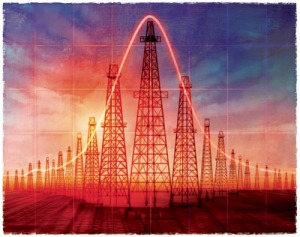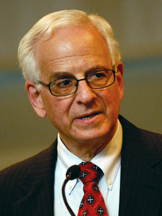Page added on April 11, 2013
Robert Hirsch: Peak Oil as seen through the eyes of Arab oil producers

Summary: One of the world’s great energy experts reports on the view from a energy conference in Qatar. Oil is the fountain of their prosperity, and they well understand how brief the Age of Oil will be.
Neftegax.Ru, 16 March 2010
.
Reflections by Robert Hirsch on the Conference “Peak Oil: Challenges and Opportunities for the GCC Countries”, held at Doha, Qatar on 2-4 April 2013
.
I was fortunate to be among the few westerners invited to attend and speak at this first-of-its kind “peak oil” (PO) conference in a Middle East. The fact that a major Middle East oil exporter would hold such a conference on what has long been a verboten subject was quite remarkable and a dramatic change from decades of PO denial. The two and a half day meeting was well attended by people from the GCC as well as other regional countries.
The going-in assumption was that “peak oil” will occur in the near future. The timing of the impending onset of world oil decline was not an issue at the conference, rather the main focus was what the GCC countries should do soon to ensure a prosperous, long-term future. To many of us who have long suffered the vociferous denial of PO by Gulf Cooperation Council (GCC) and OPEC countries, this conference represented a major change. In the words of Kjell Aleklett (Professor of Physics at Uppsala University, Sweden), who summarized highlights of the conference, the meeting was “an historic event.”
While many PO aficionados have been focused on the impacts and the mitigation of “peak oil” in the importing countries, most attendees at this conference were concerned with the impact that finite oil and gas reserves will have on the long-term future of their own exporting countries. They see the depletion of their large-but-limited reserves as affording their countries a period of time in which they either develop their countries into sustainable entities able to continue into the long term future or they lapse back into the poor, nomadic circumstances that existed prior to the discovery of oil/gas. Accordingly, much of the conference focus was on how the GCC countries might use their current and near-term largesse to build sustainable economic and government futures.
A flavor of the conference can be gotten from the following loosely translated, random quotations:
.
About the Conference:
- This is a groundbreaking conference.
- The organizers were brave to organize this conference.
Peak Oil:
- Peak oil provides an incentive to consider important national and regional issues. The GCC is currently working new problems with old solutions.
- Oil revenue represents about 93% of the Saudi budget. Everything is now imported — foreign expertise and most labor. Saudi can’t continue on the current track, because it would lead to a “bad future.” We need radical change.
- After peak oil, will there be great cities, or will Middle East cities end up like the gold mining ghost towns of the old U.S. west?
- So far we have wasted our opportunity.
- Shale oil in the U.S. is so much foolishness and does not invalidate peak oil. We definitely must worry about peak oil.
The Gulf States:
- Political reforms have failed to properly address our lack of democracy and accountability.
- When people are excluded from politics, they get unruly.
- Citizens in the Middle East prefer public sector jobs because they pay better than private sector jobs.
- Foreigners are the majority of our populations, typically 80%.
- Schools are teaching children “old stuff.” Schools are a disaster.
- The current culture is one of waste.
- There are job vacancies in Saudi but local people are not prepared to fill them. Saudi’s go abroad to get advanced degrees but don’t qualify for Saudi jobs, so Saudi must import foreign labor. Aramco did a good job of training Saudi nationals.
- The GCC must educate women and give them greater rights and equality.
- In many countries absolute rulers get the incomes and revenues and not much is left for the people. A selfish dictator does not develop his country.
- The Arab legal system is in bad shape and needs attention.
- People read religious literature when they should be reading technical literature.
- The region has wealthy, wealthy persons and poor, poor people.
- Rulers must understand that the people must be part of the future.
- Future generations must have rights.
About the world and peak oil:
- Globalization is being broadly viewed more negatively now. When peak oil comes, it will be extremely difficult to maintain.
- High oil prices will impact the world even before the onset of peak oil.
- Peak oil is the most important question in this part of the world.
Robert Hirsch
.
About the author
Robert Hirsch ran the US Fusion Program during the 1970′s, and went from there to become one of America’s top energy experts. Here is a brief biography.
He was the lead author of one of the major papers about 21st century energy: “Peaking of World Production: Impacts, Mitigation, and Risk Management“ (aka “Mitigations”), commissioned by the Dept of Energy, published February 2005. Co-authors are the economists Roger Bezdek and Robert Wendling. They also wrote The Impending World Energy Mess: What It Is and What It Means to You (2010).
See Wikipedia for a list of his positions and publications. He has over 50 publications, plus 14 patents — including Farnsworth–Hirsch fusor (see Wikipedia).
For More Information about Peak Oil
- When will global oil production peak? Here is the answer!, 1 November 2007
- The most dangerous form of Peak Oil, 8 April 2008
- The three forms of Peak Oil (let’s hope for the benign form) , 23 April 2008
- An effective rebuttal to warnings about Peak Oil? , 5 May 2008
- When the King of Saudi Arabia talks about oil, we should listen , 2 July 2008
- Red Alert: the Saudi Princes have announced the arrival of Peak Oil , 11 July 2008
- Good news about oil, but for our grandkids – not us , 14 July 2008
- Let’s “hope and pray that Hirsch is wrong”, 10 January 2009
- Poor peak oil research, more evidence of a serious problem with America’s vision, 5 May 2009
- What caused the Spring 2008 spike in oil prices?, 22 April 2010
- Science: “Oil Peak or Panic?”, 20 May 2010
- Recovering lost knowledge about exhaustion of Earth’s resources (such as Peak Oil), 27 January 2011
- A look at forecasts for peak oil – and the end of civilization, 13 July 2012
Tom Tomorrow looks at America’s energy policy
From 29 November 2005. See Tom’s work at his website This Modern World.
9 Comments on "Robert Hirsch: Peak Oil as seen through the eyes of Arab oil producers"




Arthur75 on Thu, 11th Apr 2013 2:11 pm
“vociferous denial of PO by Gulf Cooperation Council (GCC) and OPEC countries”
Because of course this doesn’t occur in the “west”, right ?
And the first oil shock wasn’t a direct consequence of US 1970 peak much more thant the “arab embargo” ?
BillT on Thu, 11th Apr 2013 2:46 pm
How does it go?
My father rode a camel.
I drive a car.
My son flies a plane.
My grandson will ride a camel.
I think that sums it up pretty well.
Nothing can be done in that area to make it prosperous after oil.
But the rest of the world will not be much better off. At least they will have camels. The West will have hundreds of millions of rusting out, unpaid for, vehicles everywhere. Hundreds of millions of empty buildings with collapsed roofs. There will not even be enough NG to cremate the billions that will die over the next few decades. Dust to dust in an old blanket, if they are wealthy, just dirt if they are not. Or left to rot wherever they die. Not a pretty picture, but quite possible.
rollin on Thu, 11th Apr 2013 2:51 pm
So much of the list models western nations except they don’t have as much oil. The first big sign that the Saudi’s recognized peak oil was when they started installing solar PV.
rollin on Thu, 11th Apr 2013 2:54 pm
BillT, your description sounds like the plague years in Europe where bodies were just piled in the streets and cities became deserted.
moli on Thu, 11th Apr 2013 4:42 pm
bill. . yet its amazing that islam reached out from such a place
J-Gav on Thu, 11th Apr 2013 6:13 pm
Some great notes from Hirsch. Globalization is toast and pretends not to understand its plight …
“High oil prices will impact … before the onset of peak oil.” Euh, does this mean that they actually haven’t yet noticed that peak production happened in the mid-2000s? Or that they’re happy with the muck we now classify as ‘oil’ to re-assure everbody? Give us a break GCC … I think there are several of us on this forum who have glocked these scams …
Arthur on Thu, 11th Apr 2013 8:42 pm
“At least they will have camels.”
You are too pessimistic. No oil, yet a lot of fun (Utah 1861-1865):
http://www.youtube.com/watch?v=y4ZLXvnDEVQ
Think of it: no worries about car insurance, yearly test, commuting every day, no women wining that they want Chanel no 5… one big liberation!
BillT on Fri, 12th Apr 2013 2:39 am
rollin, what will happen in LA if the power stops permanently? NYC? Tokyo? Paris? London? Millions dead in a week. No one to pick them up and bury them. Yes, that might be a good comparison for what could happen.
moli, religion will die out when there is obviously no ‘salvation’ coming, only death and starvation. Religion is an invention of the elite to keep you a servant. Nothing more.
Arthur on Fri, 12th Apr 2013 7:32 am
“religion will die out when there is obviously no ‘salvation’ coming, only death and starvation.”
Not even a smart jew and collapse entrepreneur like Dmitri Orlov is so pessimistic as you are.
This is exactly you, Bill:
“Outside this last circle of denial lies a vast wilderness called the Collapse of Western Civilization, roamed by the Four Horsemen of the Apocalypse, or so some people will have you believe. Here we find not denial but escapism: a hankering for a grand finale, a heroic final chapter. Civilizations do collapse – this is one of the best-known facts about them – but as anyone who has read The Decline and Fall of the Roman Empire will tell you, the process can take many centuries.”
http://www.fromthewilderness.com/free/ww3/060105_soviet_lessons.shtml
There will be life after the oilcrash.